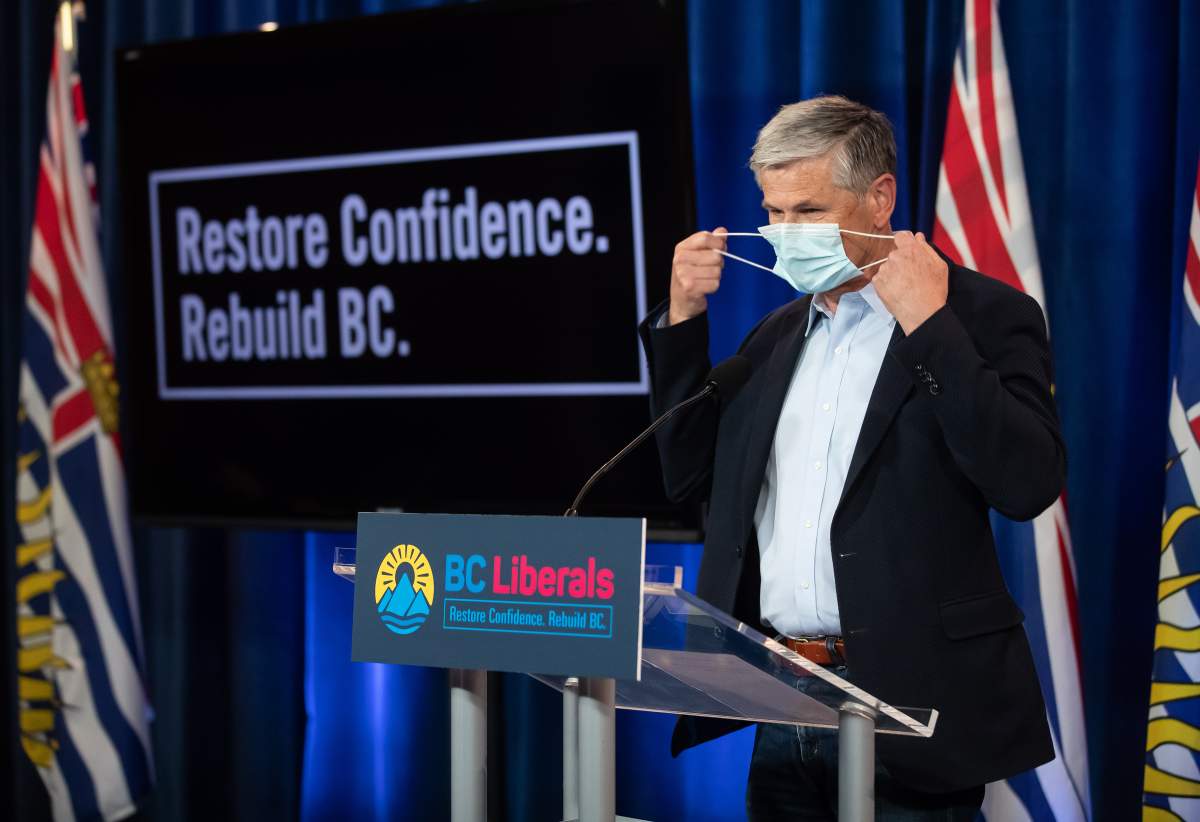In a 34-page provincial election post-mortem report, the BC Liberals are pointing at the fact it was a snap election, leader Andrew Wilkinson’s “stilted” and “combative” approach, and a pair of high-profile controversies as reasons for their crushing loss last October.

The independent review, including interviews with candidates and key decision-makers, focuses on multiple facets of the election campaign. The Liberals won 28 seats — the party’s worst performance since 1991 — and Wilkinson stepped down following the defeat.
The report, released Friday, says the biggest communications challenge was the handling of the controversies surrounding incumbents Laurie Throness and Jane Thornthwaite.
“The campaign got sidetracked by issues relating to internal party decisions. The issues that surfaced should have been dealt with in a far more decisive way. The hesitancy to deal with these issues was a missed opportunity,” one unnamed survey respondent said.
The report says there was a sense early in the campaign that Premier John Horgan had not given a satisfactory explanation for why he’d called a snap election.
However, any sense of momentum the campaign had was stalled when the Thornthwaite and Throness controversies hit the news.
Thornthwaite ended up losing her seat following the release of a recording of a virtual Zoom event, billed as a “roast” of former BC Liberal MLA Ralph Sultan.
In the video, Thornthwaite is seen making offensive comments about BC NDP MLA Bowinn Ma.

Throness, meanwhile, was forced to resign as a BC Liberal candidate mid-campaign following comments at an Oct. 14 all-candidates meeting in which he compared contraception to eugenics.
Some people interviewed for the report felt that Throness should have never been allowed to run.

Get breaking National news
“The twin controversies were easy for the public to understand and difficult to quickly move past,” the report reads.
“Officials said that the party’s tolerance of his behaviour resulted from a fundamental tension which exists within the BC Liberal Party and most other centre-right parties in Canada. There is a belief, correct or otherwise, that alienating socially conservative Christian voters will make it impossible to assemble a winning coalition. It was generally agreed upon that Wilkinson should have removed Throness as a candidate earlier than he did.”

Wilkinson’s own leadership skills were seen as a crucial reason for the party’s poor showing.
The report says it is not particularly useful to rehash criticisms of him, but it is noteworthy that many people felt that he struggled to come across well on television and online video.
People reported that in one-on-one situations, Wilkinson came across as thoughtful and empathetic – someone who strove to understand complex problems and solve them. However, a common refrain was that on screen, he came across as “stilted,” “combative” and “uncomfortable.”
BC Liberals asked to participate in the survey said his performance in the campaign was a four out of 10.

“Not all comments were negative. Many people were sympathetic to the circumstances of the campaign, felt that Wilkinson would have made a great premier and did the best as could be expected,” the report reads.
“However, even among his biggest fans, there was a general sense that he did not possess some of the intangible qualities that would be required for someone to break through under such difficult political circumstances.”
The BC Liberals found the greatest impact on the election result was that Horgan had control over the timing of the vote and that he timed it opportunely for the BC NDP. The party also struggled to get public attention due to COVID-19 restrictions and an intense focus on public health information.
“It was an effective political calculation,” the report reads, referring to Horgan’s snap call.
“In interviews, the question arose whether the election was winnable. Most senior staff interviewed felt that by the time the election was called, it probably was not. However, many felt that the BC Liberals could have retained more of their seats with a different strategy, message and leadership style.”
The party is in the midst of a leadership campaign to replace Wilkinson. So far, Kevin Falcon, Michael Lee, Gavin Dew and Ellis Ross have announced plans to run. Renee Merrifield is expected to announce soon she will be entering the race as well.









Comments
Want to discuss? Please read our Commenting Policy first.